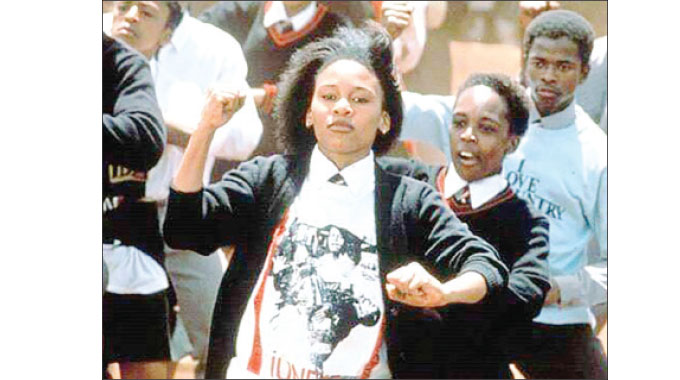‘It opened doors for us’. . . Leleti Khumalo on 30 years of Sarafina

It’s hard to imagine it’s been three decades. It seems like it was just the other year when the movie Sarafina wowed audiences across the globe.
After its release, young people around South Africa organised themselves into groups and started practising the dance moves. They performed for family, events and at school assemblies. Everyone wanted the spotlight, but there could only be one Sarafina.
It’s iconic. The picture of a young Leleti Khumalo dressed in black and white with a picture of Hector Pieterson on her shirt, her hair blowing in the wind while her peers dance in a huge circle around her is unforgettable. She has her right fist up as they run circles around her on a dusty field in Soweto, singing Freedom is Coming Tomorrow!
This year marks 30 years since the legendary film Sarafina was made. The movie first premièred at the Cannes Film Festival in May 1992, before it hit South Africa in October that same year. Since then, it has been trending almost every year around Youth Day on June 16 as it is based on the student’s fight against the use of Afrikaans as the main medium of education in South Africa.

Leleti says they did not realise then how big the film would be.
“I don’t even think the producers and director had any idea that we were making history. It’s a film, yes, but it’s a part of our history,” she says.
She had travelled the world doing Sarafina and the musical had been on Broadway, so she was shocked that she was asked to audition for the role.
“I mean I had been doing it on stage for four years and here I was being told I had to audition, I was surprised but I did it. Thankfully I made the cut. This was the first production that introduced me to the industry globally. I was about 22 years old at the time and it opened a lot of doors for us.
“It also put South Africa on the map. I remember being in New York during a tour and people were talking about how great it was.”

She loves how, over the years, different generations have related to the movie.
“There was a generation that always made sure they wear uniforms and do the dance from the movie. Ama2000 make memes about it and now there is also a new generation that is enjoying it. My twins are nine years old and they asked me to teach them the dance because they were going to do it at school.
“They said they wanted to get a head start so that by the time they are taught at school, they already know it. I taught them and it was so much fun for us. They have loved the film since their father played it for them. It was so cute going to their school to watch them perform. Little Grade Threes doing it, it was so moving.”
Leleti says every year in June, she gets messages from all over the world from people who say what Sarafina means to them.
“It is an honour, it’s humbling and heart-warming. June should just be Sarafina month because most youth day celebrations include some element from the movie,” she jokes.
She has a theatre and stage background and while she enjoys being on the big and small screen, the theatre will always be her favourite, she says.

“Acting is never easy and the stage teaches you everything about acting. I will always prefer the stage because it is live. You can see your audience’s faces and they can feel you too.
I really miss being on stage.”
Leleti says as actors, they do a lot of pretending for their different roles on the different shows, some are millionaires and others are evil, whereas their reality is nowhere close to the characters they play. But on Sarafina, they were not acting, it was a depiction of the real lives of black South Africans.
“That was our life. We knew there were doors we could not use at shops, there were chairs we could not sit on, and places we could not go to. It was our life and it was hard.
“If there was anything I would want young people to remember, it is that everything they have now was hard-earned.
The freedoms they are enjoying today were paid for and are things we could only dream of at their age. They should know our history and respect it. It did not happen automatically, people died.” – Drum










Comments